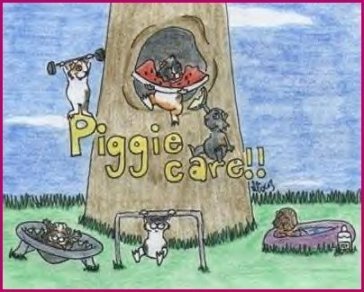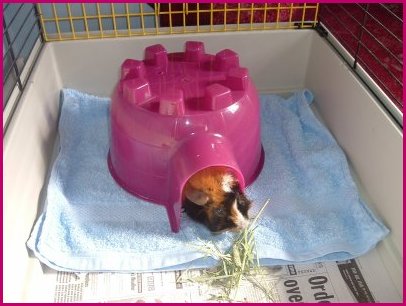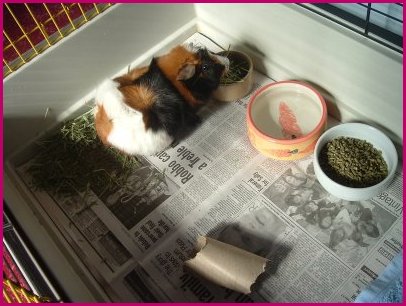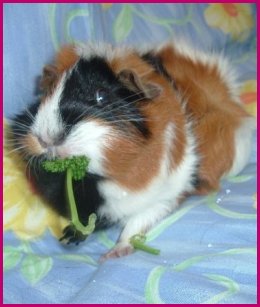|
 Hospital Cage
Hospital Cage
I have a cage that I use, should any of my guinea pigs need it when poorly. I call it the 'hospital cage' As long as your
guinea pigs illness isn't infectious, then the hospital cage can be placed next to
their cage mates. That way your ill guinea pig will
still feel at home in familiar surroundings, be able to see, smell and if they are
feeling up to it, interact with their cage mates. If it is an infectious illness, keep a very close eye on all your
guinea pigs as they may have already caught the infection. When caring for a guinea pig that has an infectious illness, its wise to put the poorly guinea pig in another room and wait for the all clear from your vet, before putting
your guinea pig near or back in with their cage mates. Remember to always wash your hands before and after handling a poorly guinea pig. In a seperate cage, they will also have the option of having the opportunity to rest, without a possible disturbance from a cage mate wanting to pinch their sleeping area and most importantly it avoids a cage mate wanting to mess with any stitches if they have needed an operation.
Keeping your ill guinea pig separated will give you the added advantage of being able to monitor their urine and poops and to look for signs of blood or infection. Some guinea pigs develop a very close bond with their cage mate so you will need to talk to your vet whether the separation would mean the poorly guinea pig would be more stressed away from their cage mate.
Peachy is going to play 'hospital patient' for this page.
Preparing your cage:
If your cage has been in storage, make sure its clean by giving it a wash, rinse well and allow to dry.
Line the cage bottom with a few layers of newspaper. Add a clean light coloured folded towel at one end of the cage for the
guinea pigs bedding area. When my boys Squeekie and Jake were neutered, I went out and bought 20 hand towels from a 'pound shop'. You need quite a few as they need to be
changed several times a day and of course you
have to allow time for washing and drying the used towels. Using light coloured towels will enable you to monitor your guinea pigs output of urine and poops. If your guinea
pig has needed stitches, you will be able to see signs of blood or infection more easily.
Although I've never tried it myself, I've heard many good reports about Vetbed. I may buy some and update my page to give you my verdict.

Peachy in a prepared hospital cage
For extra comfort, your guinea pig may appreciate using a cavy cosy to sleep in.

Peachy in her cavy cosy
If your guinea pig prefers to sleep undercover, you could provide them with a piggy igloo or a wooden house.

Peachy in her piggy igloo
Alternatively, you could make them a little
cardboard house and place it in the bedding area. Cut the base out and make an entrance hole. You will need to replace a cardboard house frequently as the sides will soon become wet and stained with urine. Make sure you remove any tape or staples.
You will need to provide a bowl of pellets and 3 or 4 handfuls of fresh hay and place
them at the opposite end of the cage. If you are using a larger cage, then leaving food and water near your guinea pig may be easier for them.
You can also attach a water feeding bottle and a bowl of water. Poorly guinea find it easier to use a bowl of water. You just
need to keep the water free from bedding and the odd stray poop, so change the water frequently.
Even if your hand feeding your guinea pig, you still need to provide, water, pellets and hay in the cage at all times, just in case your guinea pig starts eating on their own.

Peachy enjoying some redigrass
Vegetables:
Before I talk about vegetables, please make sure your guinea pig is receiving veterinary care if you suspect your piggy is poorly. No site should be used as a substitute for veterinary care.
If your guinea pig has diarrhoea, withhold all vegetables until the diarrhoea has stopped. See my page on Hand feeding for further information.
If your guinea pig
doesn't have diarrhoea, but their appetite isn't very good, its a good idea to keep a few of their favourite vegetables in the cage. Always replace uneaten vegetables after about two hours. Grass needs to be replaced even more often as it wilts very quickly.
If your guinea pig has needed dental treatment, their mouth may still be sore. Try cutting their veg up into smaller pieces as it will be easier for your piggy to eat.

Peachy enjoying some parsley
Position of the cage:
If at all possible, always house a poorly guinea pig indoors. Even if your guinea pigs living
quarters are in a shed, its still best to bring your ill guinea pig indoors. You'll be able to keep a much closer eye on your guinea pig and keep them warm.
Don't position the cage near a draught, but also do not place the cage near a radiator or any heat source.
Although they need to be warm and cosy, guinea pigs don't enjoy being too warm.
Exercise:
If your guinea pig isn't too poorly, they may feel up to stretching their legs. If your guinea pig has needed an operation/stitches, its best to ask
your vet when or if your piggy is allowed to exercise. You'll soon notice if your guinea pig is up to some exercise, they will become more active in the cage. This is exactly what
happened with my Clover. When she had a very bad UTI, after about 5 days of taking antibiotic, she became more alert and was taking
a little interest in her hay. She didn't eat enough so that I could discontinue the hand feeding, but I could
see she was more comfortable. I tried to see if she was feeling up to a
little exercise everyday, but by day 5, she was happily
walking around and not looking as depressed. Clover also had extra time for exercising when I cleaned out her cage.
Handling your poorly guinea pig:
When my Clover was poorly, I wrapped Clover up in
a towel for warmth and security and gave her gentle cuddles and held her for a few minutes each time. Its best not to over handle a poorly guinea pig as it could stress them further. Remember if they've had stitches or any major
operation, your vet will be able to let you know when normal handling can be resumed.
|
Copyright © Jackie's Guinea Piggies
|

